Corporate Governance Code and Theories: A Detailed Analysis
VerifiedAdded on 2023/01/31
|10
|3647
|33
Report
AI Summary
This report provides a comprehensive overview of corporate governance, examining various theories and their implications. It delves into the roles of shareholders and stakeholders, contrasting their interests and influence within a corporation. The report analyzes key concepts such as agency theory, stewardship theory, stakeholder theory, and shareholder theory, highlighting their strengths and weaknesses. It also discusses corporate social responsibility (CSR) and its significance in corporate strategy. Furthermore, the report explores the UK Corporate Governance Code, its application, and its impact on publicly traded companies. It examines shareholder value creation, stakeholder value, and the importance of balancing short-term and long-term goals. The analysis covers the historical context, the evolution of corporate governance practices, and the challenges faced by modern corporations in balancing the interests of diverse stakeholders. The report emphasizes the importance of effective governance structures in mitigating risks and fostering sustainable business practices. This report is an essential resource for students seeking to understand the intricacies of corporate governance.
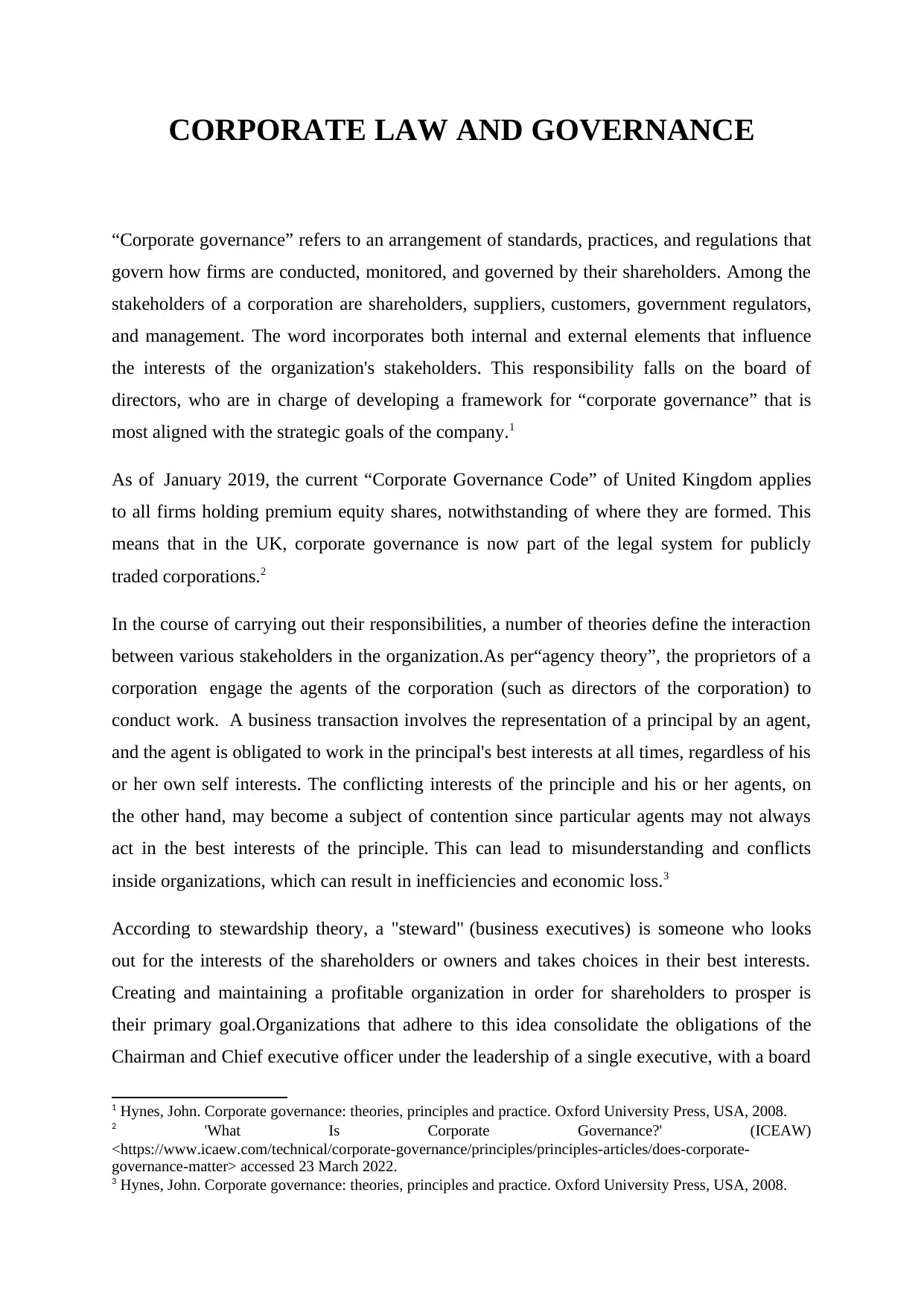
CORPORATE LAW AND GOVERNANCE
“Corporate governance” refers to an arrangement of standards, practices, and regulations that
govern how firms are conducted, monitored, and governed by their shareholders. Among the
stakeholders of a corporation are shareholders, suppliers, customers, government regulators,
and management. The word incorporates both internal and external elements that influence
the interests of the organization's stakeholders. This responsibility falls on the board of
directors, who are in charge of developing a framework for “corporate governance” that is
most aligned with the strategic goals of the company.1
As of January 2019, the current “Corporate Governance Code” of United Kingdom applies
to all firms holding premium equity shares, notwithstanding of where they are formed. This
means that in the UK, corporate governance is now part of the legal system for publicly
traded corporations.2
In the course of carrying out their responsibilities, a number of theories define the interaction
between various stakeholders in the organization.As per“agency theory”, the proprietors of a
corporation engage the agents of the corporation (such as directors of the corporation) to
conduct work. A business transaction involves the representation of a principal by an agent,
and the agent is obligated to work in the principal's best interests at all times, regardless of his
or her own self interests. The conflicting interests of the principle and his or her agents, on
the other hand, may become a subject of contention since particular agents may not always
act in the best interests of the principle. This can lead to misunderstanding and conflicts
inside organizations, which can result in inefficiencies and economic loss.3
According to stewardship theory, a "steward" (business executives) is someone who looks
out for the interests of the shareholders or owners and takes choices in their best interests.
Creating and maintaining a profitable organization in order for shareholders to prosper is
their primary goal.Organizations that adhere to this idea consolidate the obligations of the
Chairman and Chief executive officer under the leadership of a single executive, with a board
1 Hynes, John. Corporate governance: theories, principles and practice. Oxford University Press, USA, 2008.
2 'What Is Corporate Governance?' (ICEAW)
<https://www.icaew.com/technical/corporate-governance/principles/principles-articles/does-corporate-
governance-matter> accessed 23 March 2022.
3 Hynes, John. Corporate governance: theories, principles and practice. Oxford University Press, USA, 2008.
“Corporate governance” refers to an arrangement of standards, practices, and regulations that
govern how firms are conducted, monitored, and governed by their shareholders. Among the
stakeholders of a corporation are shareholders, suppliers, customers, government regulators,
and management. The word incorporates both internal and external elements that influence
the interests of the organization's stakeholders. This responsibility falls on the board of
directors, who are in charge of developing a framework for “corporate governance” that is
most aligned with the strategic goals of the company.1
As of January 2019, the current “Corporate Governance Code” of United Kingdom applies
to all firms holding premium equity shares, notwithstanding of where they are formed. This
means that in the UK, corporate governance is now part of the legal system for publicly
traded corporations.2
In the course of carrying out their responsibilities, a number of theories define the interaction
between various stakeholders in the organization.As per“agency theory”, the proprietors of a
corporation engage the agents of the corporation (such as directors of the corporation) to
conduct work. A business transaction involves the representation of a principal by an agent,
and the agent is obligated to work in the principal's best interests at all times, regardless of his
or her own self interests. The conflicting interests of the principle and his or her agents, on
the other hand, may become a subject of contention since particular agents may not always
act in the best interests of the principle. This can lead to misunderstanding and conflicts
inside organizations, which can result in inefficiencies and economic loss.3
According to stewardship theory, a "steward" (business executives) is someone who looks
out for the interests of the shareholders or owners and takes choices in their best interests.
Creating and maintaining a profitable organization in order for shareholders to prosper is
their primary goal.Organizations that adhere to this idea consolidate the obligations of the
Chairman and Chief executive officer under the leadership of a single executive, with a board
1 Hynes, John. Corporate governance: theories, principles and practice. Oxford University Press, USA, 2008.
2 'What Is Corporate Governance?' (ICEAW)
<https://www.icaew.com/technical/corporate-governance/principles/principles-articles/does-corporate-
governance-matter> accessed 23 March 2022.
3 Hynes, John. Corporate governance: theories, principles and practice. Oxford University Press, USA, 2008.
Paraphrase This Document
Need a fresh take? Get an instant paraphrase of this document with our AI Paraphraser
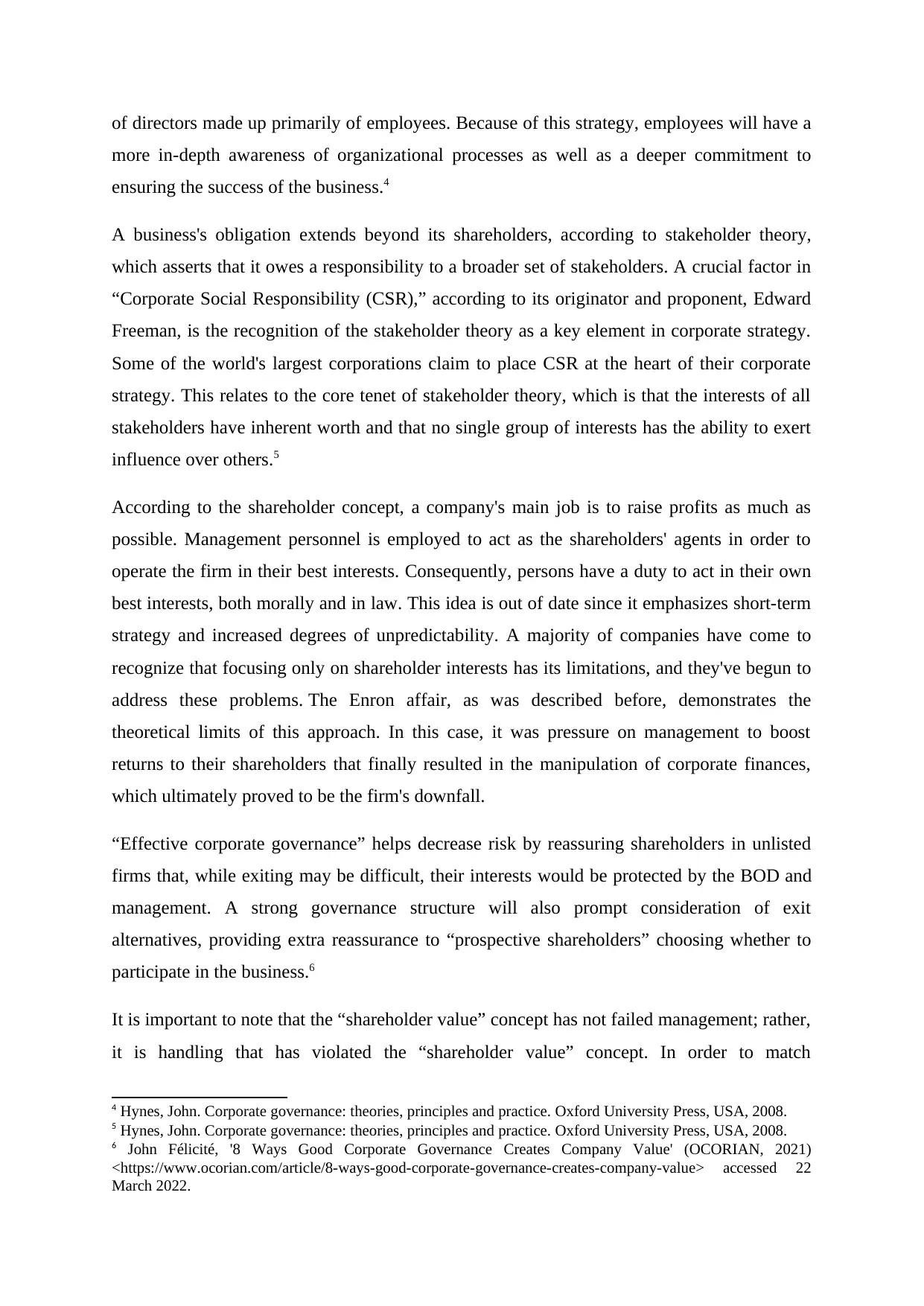
of directors made up primarily of employees. Because of this strategy, employees will have a
more in-depth awareness of organizational processes as well as a deeper commitment to
ensuring the success of the business.4
A business's obligation extends beyond its shareholders, according to stakeholder theory,
which asserts that it owes a responsibility to a broader set of stakeholders. A crucial factor in
“Corporate Social Responsibility (CSR),” according to its originator and proponent, Edward
Freeman, is the recognition of the stakeholder theory as a key element in corporate strategy.
Some of the world's largest corporations claim to place CSR at the heart of their corporate
strategy. This relates to the core tenet of stakeholder theory, which is that the interests of all
stakeholders have inherent worth and that no single group of interests has the ability to exert
influence over others.5
According to the shareholder concept, a company's main job is to raise profits as much as
possible. Management personnel is employed to act as the shareholders' agents in order to
operate the firm in their best interests. Consequently, persons have a duty to act in their own
best interests, both morally and in law. This idea is out of date since it emphasizes short-term
strategy and increased degrees of unpredictability. A majority of companies have come to
recognize that focusing only on shareholder interests has its limitations, and they've begun to
address these problems. The Enron affair, as was described before, demonstrates the
theoretical limits of this approach. In this case, it was pressure on management to boost
returns to their shareholders that finally resulted in the manipulation of corporate finances,
which ultimately proved to be the firm's downfall.
“Effective corporate governance” helps decrease risk by reassuring shareholders in unlisted
firms that, while exiting may be difficult, their interests would be protected by the BOD and
management. A strong governance structure will also prompt consideration of exit
alternatives, providing extra reassurance to “prospective shareholders” choosing whether to
participate in the business.6
It is important to note that the “shareholder value” concept has not failed management; rather,
it is handling that has violated the “shareholder value” concept. In order to match
4 Hynes, John. Corporate governance: theories, principles and practice. Oxford University Press, USA, 2008.
5 Hynes, John. Corporate governance: theories, principles and practice. Oxford University Press, USA, 2008.
6 John Félicité, '8 Ways Good Corporate Governance Creates Company Value' (OCORIAN, 2021)
<https://www.ocorian.com/article/8-ways-good-corporate-governance-creates-company-value> accessed 22
March 2022.
more in-depth awareness of organizational processes as well as a deeper commitment to
ensuring the success of the business.4
A business's obligation extends beyond its shareholders, according to stakeholder theory,
which asserts that it owes a responsibility to a broader set of stakeholders. A crucial factor in
“Corporate Social Responsibility (CSR),” according to its originator and proponent, Edward
Freeman, is the recognition of the stakeholder theory as a key element in corporate strategy.
Some of the world's largest corporations claim to place CSR at the heart of their corporate
strategy. This relates to the core tenet of stakeholder theory, which is that the interests of all
stakeholders have inherent worth and that no single group of interests has the ability to exert
influence over others.5
According to the shareholder concept, a company's main job is to raise profits as much as
possible. Management personnel is employed to act as the shareholders' agents in order to
operate the firm in their best interests. Consequently, persons have a duty to act in their own
best interests, both morally and in law. This idea is out of date since it emphasizes short-term
strategy and increased degrees of unpredictability. A majority of companies have come to
recognize that focusing only on shareholder interests has its limitations, and they've begun to
address these problems. The Enron affair, as was described before, demonstrates the
theoretical limits of this approach. In this case, it was pressure on management to boost
returns to their shareholders that finally resulted in the manipulation of corporate finances,
which ultimately proved to be the firm's downfall.
“Effective corporate governance” helps decrease risk by reassuring shareholders in unlisted
firms that, while exiting may be difficult, their interests would be protected by the BOD and
management. A strong governance structure will also prompt consideration of exit
alternatives, providing extra reassurance to “prospective shareholders” choosing whether to
participate in the business.6
It is important to note that the “shareholder value” concept has not failed management; rather,
it is handling that has violated the “shareholder value” concept. In order to match
4 Hynes, John. Corporate governance: theories, principles and practice. Oxford University Press, USA, 2008.
5 Hynes, John. Corporate governance: theories, principles and practice. Oxford University Press, USA, 2008.
6 John Félicité, '8 Ways Good Corporate Governance Creates Company Value' (OCORIAN, 2021)
<https://www.ocorian.com/article/8-ways-good-corporate-governance-creates-company-value> accessed 22
March 2022.
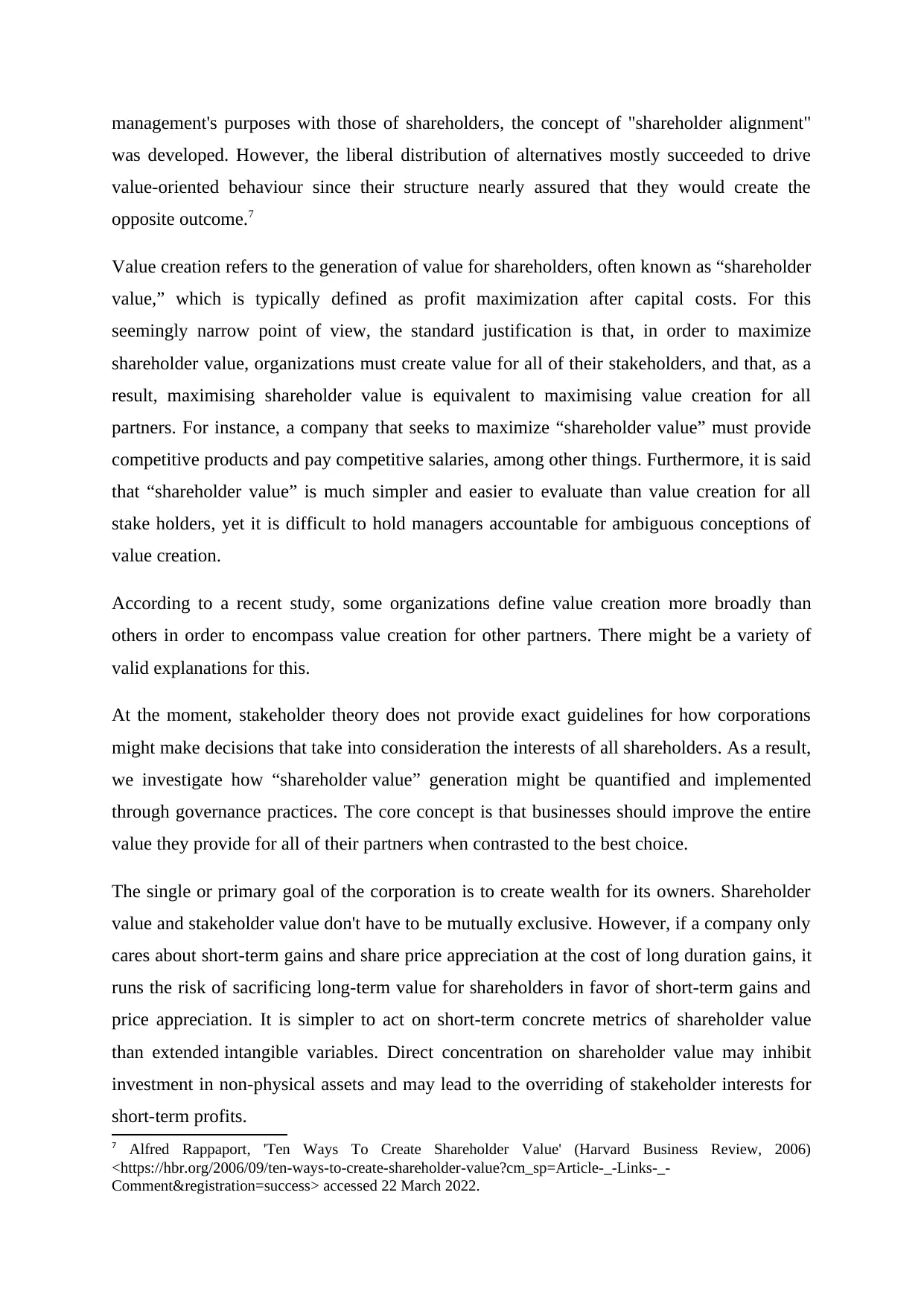
management's purposes with those of shareholders, the concept of "shareholder alignment"
was developed. However, the liberal distribution of alternatives mostly succeeded to drive
value-oriented behaviour since their structure nearly assured that they would create the
opposite outcome.7
Value creation refers to the generation of value for shareholders, often known as “shareholder
value,” which is typically defined as profit maximization after capital costs. For this
seemingly narrow point of view, the standard justification is that, in order to maximize
shareholder value, organizations must create value for all of their stakeholders, and that, as a
result, maximising shareholder value is equivalent to maximising value creation for all
partners. For instance, a company that seeks to maximize “shareholder value” must provide
competitive products and pay competitive salaries, among other things. Furthermore, it is said
that “shareholder value” is much simpler and easier to evaluate than value creation for all
stake holders, yet it is difficult to hold managers accountable for ambiguous conceptions of
value creation.
According to a recent study, some organizations define value creation more broadly than
others in order to encompass value creation for other partners. There might be a variety of
valid explanations for this.
At the moment, stakeholder theory does not provide exact guidelines for how corporations
might make decisions that take into consideration the interests of all shareholders. As a result,
we investigate how “shareholder value” generation might be quantified and implemented
through governance practices. The core concept is that businesses should improve the entire
value they provide for all of their partners when contrasted to the best choice.
The single or primary goal of the corporation is to create wealth for its owners. Shareholder
value and stakeholder value don't have to be mutually exclusive. However, if a company only
cares about short-term gains and share price appreciation at the cost of long duration gains, it
runs the risk of sacrificing long-term value for shareholders in favor of short-term gains and
price appreciation. It is simpler to act on short-term concrete metrics of shareholder value
than extended intangible variables. Direct concentration on shareholder value may inhibit
investment in non-physical assets and may lead to the overriding of stakeholder interests for
short-term profits.
7 Alfred Rappaport, 'Ten Ways To Create Shareholder Value' (Harvard Business Review, 2006)
<https://hbr.org/2006/09/ten-ways-to-create-shareholder-value?cm_sp=Article-_-Links-_-
Comment®istration=success> accessed 22 March 2022.
was developed. However, the liberal distribution of alternatives mostly succeeded to drive
value-oriented behaviour since their structure nearly assured that they would create the
opposite outcome.7
Value creation refers to the generation of value for shareholders, often known as “shareholder
value,” which is typically defined as profit maximization after capital costs. For this
seemingly narrow point of view, the standard justification is that, in order to maximize
shareholder value, organizations must create value for all of their stakeholders, and that, as a
result, maximising shareholder value is equivalent to maximising value creation for all
partners. For instance, a company that seeks to maximize “shareholder value” must provide
competitive products and pay competitive salaries, among other things. Furthermore, it is said
that “shareholder value” is much simpler and easier to evaluate than value creation for all
stake holders, yet it is difficult to hold managers accountable for ambiguous conceptions of
value creation.
According to a recent study, some organizations define value creation more broadly than
others in order to encompass value creation for other partners. There might be a variety of
valid explanations for this.
At the moment, stakeholder theory does not provide exact guidelines for how corporations
might make decisions that take into consideration the interests of all shareholders. As a result,
we investigate how “shareholder value” generation might be quantified and implemented
through governance practices. The core concept is that businesses should improve the entire
value they provide for all of their partners when contrasted to the best choice.
The single or primary goal of the corporation is to create wealth for its owners. Shareholder
value and stakeholder value don't have to be mutually exclusive. However, if a company only
cares about short-term gains and share price appreciation at the cost of long duration gains, it
runs the risk of sacrificing long-term value for shareholders in favor of short-term gains and
price appreciation. It is simpler to act on short-term concrete metrics of shareholder value
than extended intangible variables. Direct concentration on shareholder value may inhibit
investment in non-physical assets and may lead to the overriding of stakeholder interests for
short-term profits.
7 Alfred Rappaport, 'Ten Ways To Create Shareholder Value' (Harvard Business Review, 2006)
<https://hbr.org/2006/09/ten-ways-to-create-shareholder-value?cm_sp=Article-_-Links-_-
Comment®istration=success> accessed 22 March 2022.
⊘ This is a preview!⊘
Do you want full access?
Subscribe today to unlock all pages.

Trusted by 1+ million students worldwide
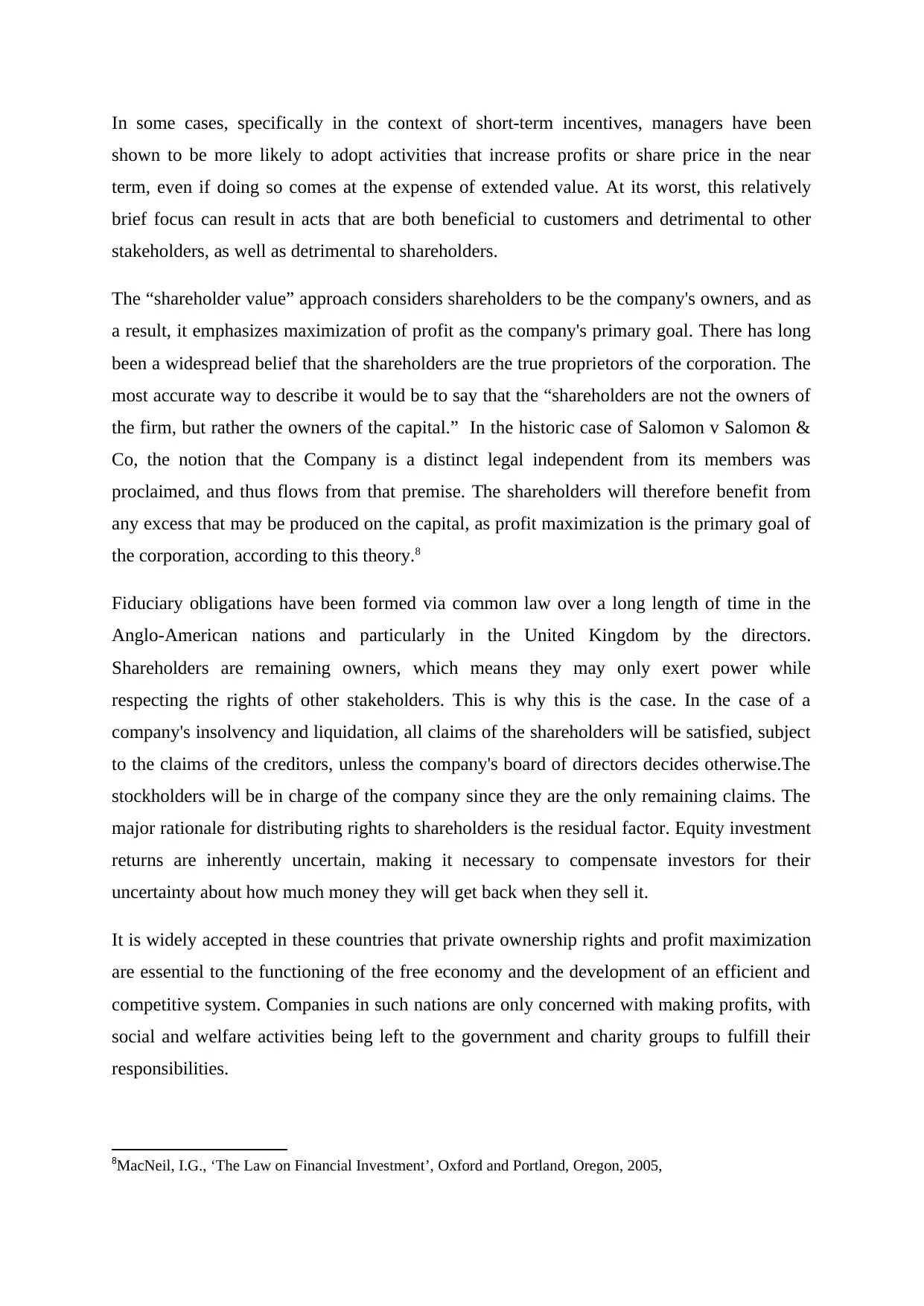
In some cases, specifically in the context of short-term incentives, managers have been
shown to be more likely to adopt activities that increase profits or share price in the near
term, even if doing so comes at the expense of extended value. At its worst, this relatively
brief focus can result in acts that are both beneficial to customers and detrimental to other
stakeholders, as well as detrimental to shareholders.
The “shareholder value” approach considers shareholders to be the company's owners, and as
a result, it emphasizes maximization of profit as the company's primary goal. There has long
been a widespread belief that the shareholders are the true proprietors of the corporation. The
most accurate way to describe it would be to say that the “shareholders are not the owners of
the firm, but rather the owners of the capital.” In the historic case of Salomon v Salomon &
Co, the notion that the Company is a distinct legal independent from its members was
proclaimed, and thus flows from that premise. The shareholders will therefore benefit from
any excess that may be produced on the capital, as profit maximization is the primary goal of
the corporation, according to this theory.8
Fiduciary obligations have been formed via common law over a long length of time in the
Anglo-American nations and particularly in the United Kingdom by the directors.
Shareholders are remaining owners, which means they may only exert power while
respecting the rights of other stakeholders. This is why this is the case. In the case of a
company's insolvency and liquidation, all claims of the shareholders will be satisfied, subject
to the claims of the creditors, unless the company's board of directors decides otherwise.The
stockholders will be in charge of the company since they are the only remaining claims. The
major rationale for distributing rights to shareholders is the residual factor. Equity investment
returns are inherently uncertain, making it necessary to compensate investors for their
uncertainty about how much money they will get back when they sell it.
It is widely accepted in these countries that private ownership rights and profit maximization
are essential to the functioning of the free economy and the development of an efficient and
competitive system. Companies in such nations are only concerned with making profits, with
social and welfare activities being left to the government and charity groups to fulfill their
responsibilities.
8MacNeil, I.G., ‘The Law on Financial Investment’, Oxford and Portland, Oregon, 2005,
shown to be more likely to adopt activities that increase profits or share price in the near
term, even if doing so comes at the expense of extended value. At its worst, this relatively
brief focus can result in acts that are both beneficial to customers and detrimental to other
stakeholders, as well as detrimental to shareholders.
The “shareholder value” approach considers shareholders to be the company's owners, and as
a result, it emphasizes maximization of profit as the company's primary goal. There has long
been a widespread belief that the shareholders are the true proprietors of the corporation. The
most accurate way to describe it would be to say that the “shareholders are not the owners of
the firm, but rather the owners of the capital.” In the historic case of Salomon v Salomon &
Co, the notion that the Company is a distinct legal independent from its members was
proclaimed, and thus flows from that premise. The shareholders will therefore benefit from
any excess that may be produced on the capital, as profit maximization is the primary goal of
the corporation, according to this theory.8
Fiduciary obligations have been formed via common law over a long length of time in the
Anglo-American nations and particularly in the United Kingdom by the directors.
Shareholders are remaining owners, which means they may only exert power while
respecting the rights of other stakeholders. This is why this is the case. In the case of a
company's insolvency and liquidation, all claims of the shareholders will be satisfied, subject
to the claims of the creditors, unless the company's board of directors decides otherwise.The
stockholders will be in charge of the company since they are the only remaining claims. The
major rationale for distributing rights to shareholders is the residual factor. Equity investment
returns are inherently uncertain, making it necessary to compensate investors for their
uncertainty about how much money they will get back when they sell it.
It is widely accepted in these countries that private ownership rights and profit maximization
are essential to the functioning of the free economy and the development of an efficient and
competitive system. Companies in such nations are only concerned with making profits, with
social and welfare activities being left to the government and charity groups to fulfill their
responsibilities.
8MacNeil, I.G., ‘The Law on Financial Investment’, Oxford and Portland, Oregon, 2005,
Paraphrase This Document
Need a fresh take? Get an instant paraphrase of this document with our AI Paraphraser
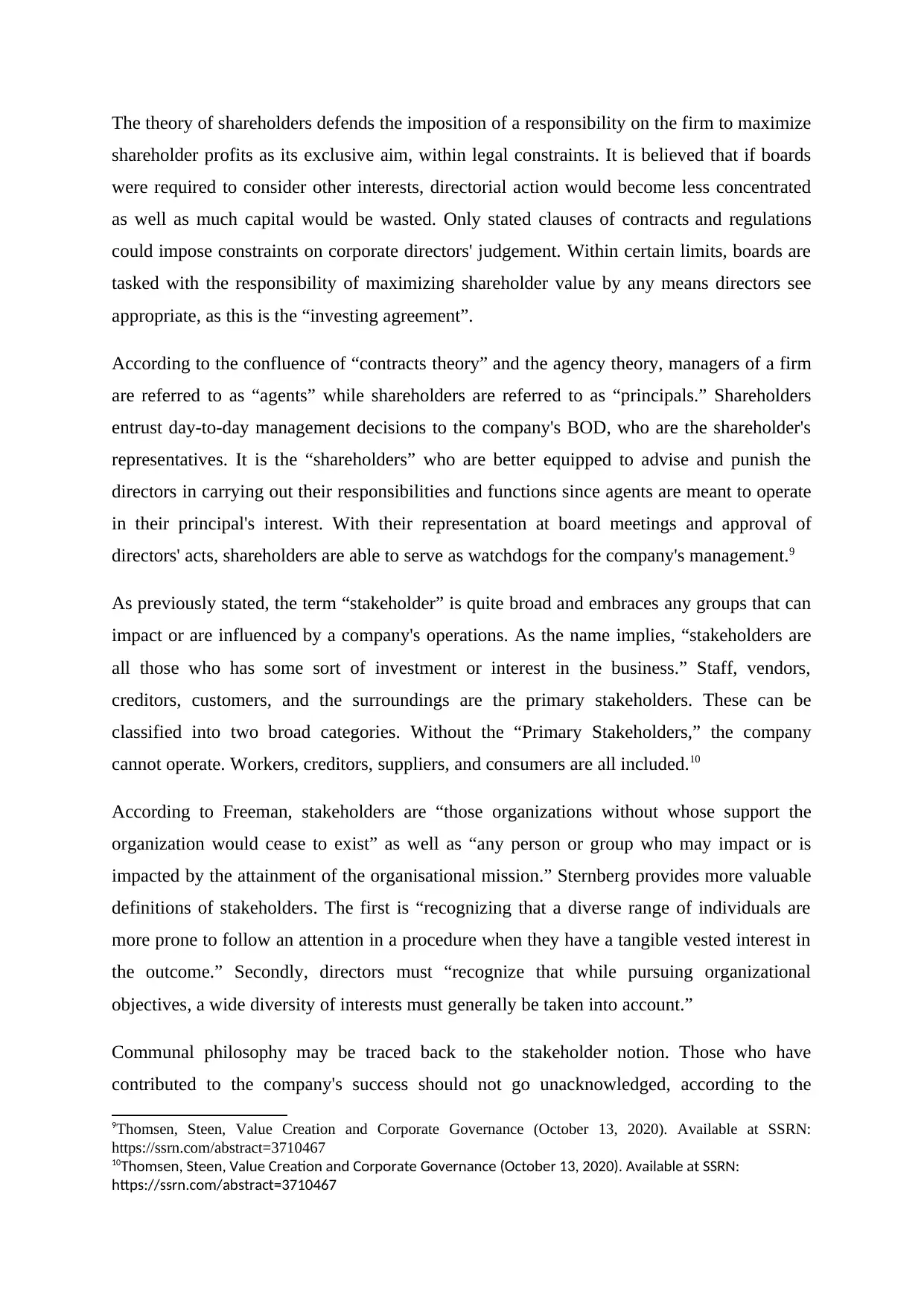
The theory of shareholders defends the imposition of a responsibility on the firm to maximize
shareholder profits as its exclusive aim, within legal constraints. It is believed that if boards
were required to consider other interests, directorial action would become less concentrated
as well as much capital would be wasted. Only stated clauses of contracts and regulations
could impose constraints on corporate directors' judgement. Within certain limits, boards are
tasked with the responsibility of maximizing shareholder value by any means directors see
appropriate, as this is the “investing agreement”.
According to the confluence of “contracts theory” and the agency theory, managers of a firm
are referred to as “agents” while shareholders are referred to as “principals.” Shareholders
entrust day-to-day management decisions to the company's BOD, who are the shareholder's
representatives. It is the “shareholders” who are better equipped to advise and punish the
directors in carrying out their responsibilities and functions since agents are meant to operate
in their principal's interest. With their representation at board meetings and approval of
directors' acts, shareholders are able to serve as watchdogs for the company's management.9
As previously stated, the term “stakeholder” is quite broad and embraces any groups that can
impact or are influenced by a company's operations. As the name implies, “stakeholders are
all those who has some sort of investment or interest in the business.” Staff, vendors,
creditors, customers, and the surroundings are the primary stakeholders. These can be
classified into two broad categories. Without the “Primary Stakeholders,” the company
cannot operate. Workers, creditors, suppliers, and consumers are all included.10
According to Freeman, stakeholders are “those organizations without whose support the
organization would cease to exist” as well as “any person or group who may impact or is
impacted by the attainment of the organisational mission.” Sternberg provides more valuable
definitions of stakeholders. The first is “recognizing that a diverse range of individuals are
more prone to follow an attention in a procedure when they have a tangible vested interest in
the outcome.” Secondly, directors must “recognize that while pursuing organizational
objectives, a wide diversity of interests must generally be taken into account.”
Communal philosophy may be traced back to the stakeholder notion. Those who have
contributed to the company's success should not go unacknowledged, according to the
9Thomsen, Steen, Value Creation and Corporate Governance (October 13, 2020). Available at SSRN:
https://ssrn.com/abstract=3710467
10Thomsen, Steen, Value Creation and Corporate Governance (October 13, 2020). Available at SSRN:
https://ssrn.com/abstract=3710467
shareholder profits as its exclusive aim, within legal constraints. It is believed that if boards
were required to consider other interests, directorial action would become less concentrated
as well as much capital would be wasted. Only stated clauses of contracts and regulations
could impose constraints on corporate directors' judgement. Within certain limits, boards are
tasked with the responsibility of maximizing shareholder value by any means directors see
appropriate, as this is the “investing agreement”.
According to the confluence of “contracts theory” and the agency theory, managers of a firm
are referred to as “agents” while shareholders are referred to as “principals.” Shareholders
entrust day-to-day management decisions to the company's BOD, who are the shareholder's
representatives. It is the “shareholders” who are better equipped to advise and punish the
directors in carrying out their responsibilities and functions since agents are meant to operate
in their principal's interest. With their representation at board meetings and approval of
directors' acts, shareholders are able to serve as watchdogs for the company's management.9
As previously stated, the term “stakeholder” is quite broad and embraces any groups that can
impact or are influenced by a company's operations. As the name implies, “stakeholders are
all those who has some sort of investment or interest in the business.” Staff, vendors,
creditors, customers, and the surroundings are the primary stakeholders. These can be
classified into two broad categories. Without the “Primary Stakeholders,” the company
cannot operate. Workers, creditors, suppliers, and consumers are all included.10
According to Freeman, stakeholders are “those organizations without whose support the
organization would cease to exist” as well as “any person or group who may impact or is
impacted by the attainment of the organisational mission.” Sternberg provides more valuable
definitions of stakeholders. The first is “recognizing that a diverse range of individuals are
more prone to follow an attention in a procedure when they have a tangible vested interest in
the outcome.” Secondly, directors must “recognize that while pursuing organizational
objectives, a wide diversity of interests must generally be taken into account.”
Communal philosophy may be traced back to the stakeholder notion. Those who have
contributed to the company's success should not go unacknowledged, according to the
9Thomsen, Steen, Value Creation and Corporate Governance (October 13, 2020). Available at SSRN:
https://ssrn.com/abstract=3710467
10Thomsen, Steen, Value Creation and Corporate Governance (October 13, 2020). Available at SSRN:
https://ssrn.com/abstract=3710467
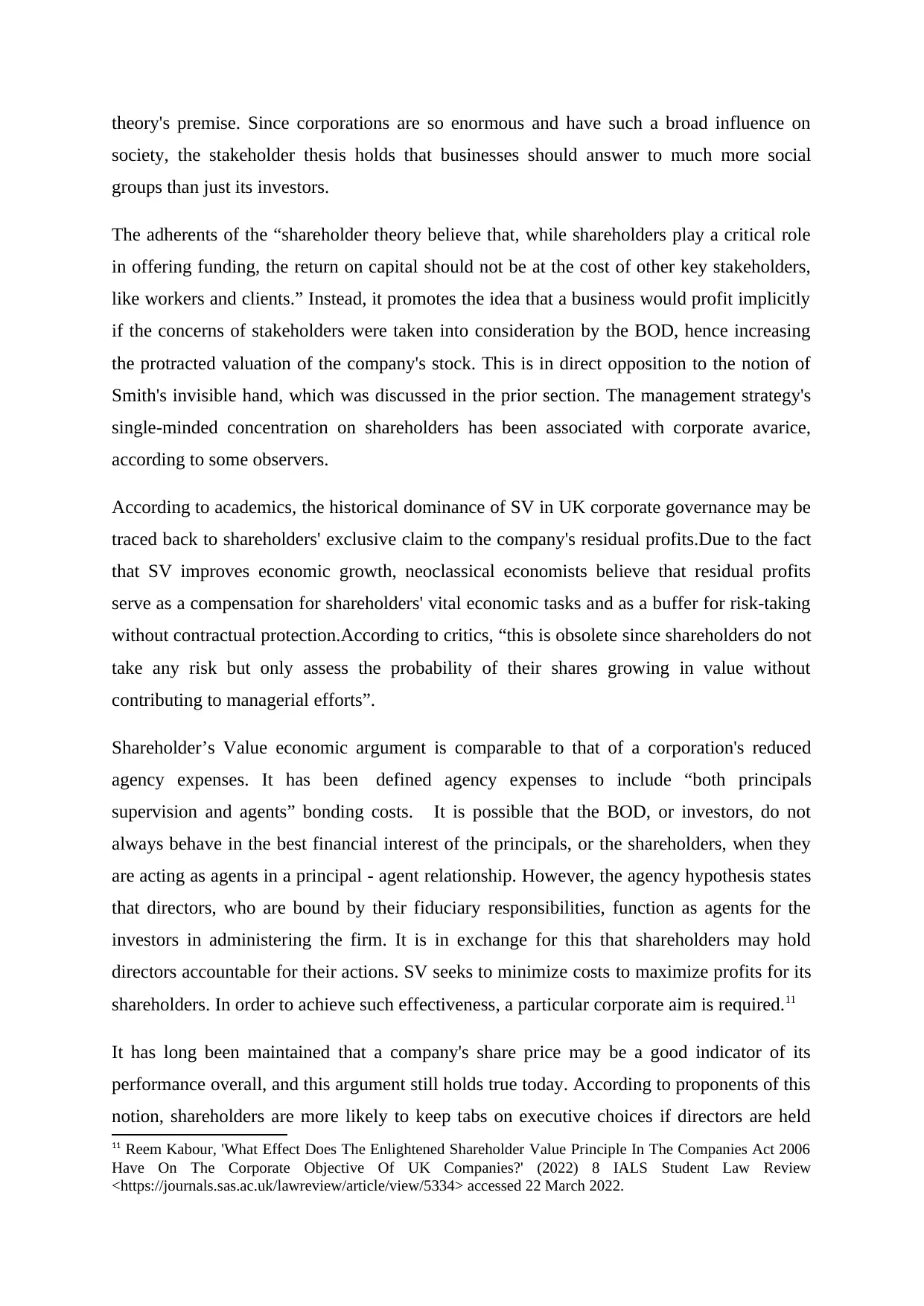
theory's premise. Since corporations are so enormous and have such a broad influence on
society, the stakeholder thesis holds that businesses should answer to much more social
groups than just its investors.
The adherents of the “shareholder theory believe that, while shareholders play a critical role
in offering funding, the return on capital should not be at the cost of other key stakeholders,
like workers and clients.” Instead, it promotes the idea that a business would profit implicitly
if the concerns of stakeholders were taken into consideration by the BOD, hence increasing
the protracted valuation of the company's stock. This is in direct opposition to the notion of
Smith's invisible hand, which was discussed in the prior section. The management strategy's
single-minded concentration on shareholders has been associated with corporate avarice,
according to some observers.
According to academics, the historical dominance of SV in UK corporate governance may be
traced back to shareholders' exclusive claim to the company's residual profits.Due to the fact
that SV improves economic growth, neoclassical economists believe that residual profits
serve as a compensation for shareholders' vital economic tasks and as a buffer for risk-taking
without contractual protection.According to critics, “this is obsolete since shareholders do not
take any risk but only assess the probability of their shares growing in value without
contributing to managerial efforts”.
Shareholder’s Value economic argument is comparable to that of a corporation's reduced
agency expenses. It has been defined agency expenses to include “both principals
supervision and agents” bonding costs. It is possible that the BOD, or investors, do not
always behave in the best financial interest of the principals, or the shareholders, when they
are acting as agents in a principal - agent relationship. However, the agency hypothesis states
that directors, who are bound by their fiduciary responsibilities, function as agents for the
investors in administering the firm. It is in exchange for this that shareholders may hold
directors accountable for their actions. SV seeks to minimize costs to maximize profits for its
shareholders. In order to achieve such effectiveness, a particular corporate aim is required.11
It has long been maintained that a company's share price may be a good indicator of its
performance overall, and this argument still holds true today. According to proponents of this
notion, shareholders are more likely to keep tabs on executive choices if directors are held
11 Reem Kabour, 'What Effect Does The Enlightened Shareholder Value Principle In The Companies Act 2006
Have On The Corporate Objective Of UK Companies?' (2022) 8 IALS Student Law Review
<https://journals.sas.ac.uk/lawreview/article/view/5334> accessed 22 March 2022.
society, the stakeholder thesis holds that businesses should answer to much more social
groups than just its investors.
The adherents of the “shareholder theory believe that, while shareholders play a critical role
in offering funding, the return on capital should not be at the cost of other key stakeholders,
like workers and clients.” Instead, it promotes the idea that a business would profit implicitly
if the concerns of stakeholders were taken into consideration by the BOD, hence increasing
the protracted valuation of the company's stock. This is in direct opposition to the notion of
Smith's invisible hand, which was discussed in the prior section. The management strategy's
single-minded concentration on shareholders has been associated with corporate avarice,
according to some observers.
According to academics, the historical dominance of SV in UK corporate governance may be
traced back to shareholders' exclusive claim to the company's residual profits.Due to the fact
that SV improves economic growth, neoclassical economists believe that residual profits
serve as a compensation for shareholders' vital economic tasks and as a buffer for risk-taking
without contractual protection.According to critics, “this is obsolete since shareholders do not
take any risk but only assess the probability of their shares growing in value without
contributing to managerial efforts”.
Shareholder’s Value economic argument is comparable to that of a corporation's reduced
agency expenses. It has been defined agency expenses to include “both principals
supervision and agents” bonding costs. It is possible that the BOD, or investors, do not
always behave in the best financial interest of the principals, or the shareholders, when they
are acting as agents in a principal - agent relationship. However, the agency hypothesis states
that directors, who are bound by their fiduciary responsibilities, function as agents for the
investors in administering the firm. It is in exchange for this that shareholders may hold
directors accountable for their actions. SV seeks to minimize costs to maximize profits for its
shareholders. In order to achieve such effectiveness, a particular corporate aim is required.11
It has long been maintained that a company's share price may be a good indicator of its
performance overall, and this argument still holds true today. According to proponents of this
notion, shareholders are more likely to keep tabs on executive choices if directors are held
11 Reem Kabour, 'What Effect Does The Enlightened Shareholder Value Principle In The Companies Act 2006
Have On The Corporate Objective Of UK Companies?' (2022) 8 IALS Student Law Review
<https://journals.sas.ac.uk/lawreview/article/view/5334> accessed 22 March 2022.
⊘ This is a preview!⊘
Do you want full access?
Subscribe today to unlock all pages.

Trusted by 1+ million students worldwide
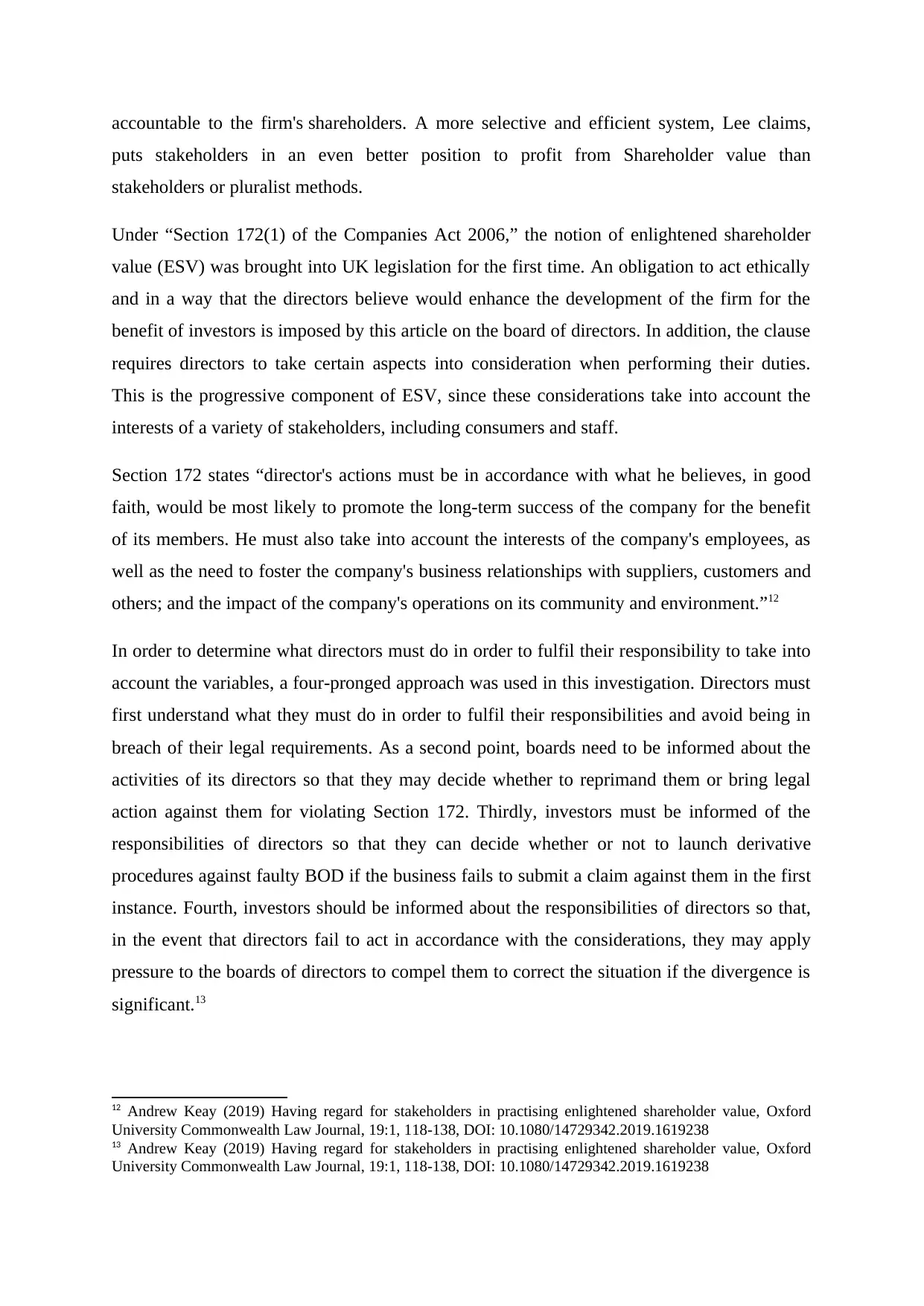
accountable to the firm's shareholders. A more selective and efficient system, Lee claims,
puts stakeholders in an even better position to profit from Shareholder value than
stakeholders or pluralist methods.
Under “Section 172(1) of the Companies Act 2006,” the notion of enlightened shareholder
value (ESV) was brought into UK legislation for the first time. An obligation to act ethically
and in a way that the directors believe would enhance the development of the firm for the
benefit of investors is imposed by this article on the board of directors. In addition, the clause
requires directors to take certain aspects into consideration when performing their duties.
This is the progressive component of ESV, since these considerations take into account the
interests of a variety of stakeholders, including consumers and staff.
Section 172 states “director's actions must be in accordance with what he believes, in good
faith, would be most likely to promote the long-term success of the company for the benefit
of its members. He must also take into account the interests of the company's employees, as
well as the need to foster the company's business relationships with suppliers, customers and
others; and the impact of the company's operations on its community and environment.”12
In order to determine what directors must do in order to fulfil their responsibility to take into
account the variables, a four-pronged approach was used in this investigation. Directors must
first understand what they must do in order to fulfil their responsibilities and avoid being in
breach of their legal requirements. As a second point, boards need to be informed about the
activities of its directors so that they may decide whether to reprimand them or bring legal
action against them for violating Section 172. Thirdly, investors must be informed of the
responsibilities of directors so that they can decide whether or not to launch derivative
procedures against faulty BOD if the business fails to submit a claim against them in the first
instance. Fourth, investors should be informed about the responsibilities of directors so that,
in the event that directors fail to act in accordance with the considerations, they may apply
pressure to the boards of directors to compel them to correct the situation if the divergence is
significant.13
12 Andrew Keay (2019) Having regard for stakeholders in practising enlightened shareholder value, Oxford
University Commonwealth Law Journal, 19:1, 118-138, DOI: 10.1080/14729342.2019.1619238
13 Andrew Keay (2019) Having regard for stakeholders in practising enlightened shareholder value, Oxford
University Commonwealth Law Journal, 19:1, 118-138, DOI: 10.1080/14729342.2019.1619238
puts stakeholders in an even better position to profit from Shareholder value than
stakeholders or pluralist methods.
Under “Section 172(1) of the Companies Act 2006,” the notion of enlightened shareholder
value (ESV) was brought into UK legislation for the first time. An obligation to act ethically
and in a way that the directors believe would enhance the development of the firm for the
benefit of investors is imposed by this article on the board of directors. In addition, the clause
requires directors to take certain aspects into consideration when performing their duties.
This is the progressive component of ESV, since these considerations take into account the
interests of a variety of stakeholders, including consumers and staff.
Section 172 states “director's actions must be in accordance with what he believes, in good
faith, would be most likely to promote the long-term success of the company for the benefit
of its members. He must also take into account the interests of the company's employees, as
well as the need to foster the company's business relationships with suppliers, customers and
others; and the impact of the company's operations on its community and environment.”12
In order to determine what directors must do in order to fulfil their responsibility to take into
account the variables, a four-pronged approach was used in this investigation. Directors must
first understand what they must do in order to fulfil their responsibilities and avoid being in
breach of their legal requirements. As a second point, boards need to be informed about the
activities of its directors so that they may decide whether to reprimand them or bring legal
action against them for violating Section 172. Thirdly, investors must be informed of the
responsibilities of directors so that they can decide whether or not to launch derivative
procedures against faulty BOD if the business fails to submit a claim against them in the first
instance. Fourth, investors should be informed about the responsibilities of directors so that,
in the event that directors fail to act in accordance with the considerations, they may apply
pressure to the boards of directors to compel them to correct the situation if the divergence is
significant.13
12 Andrew Keay (2019) Having regard for stakeholders in practising enlightened shareholder value, Oxford
University Commonwealth Law Journal, 19:1, 118-138, DOI: 10.1080/14729342.2019.1619238
13 Andrew Keay (2019) Having regard for stakeholders in practising enlightened shareholder value, Oxford
University Commonwealth Law Journal, 19:1, 118-138, DOI: 10.1080/14729342.2019.1619238
Paraphrase This Document
Need a fresh take? Get an instant paraphrase of this document with our AI Paraphraser

The research examined whether directors should engage in a balancing exercise when faced
with a disagreement between elements about a course of action. Although balancing is not
always straightforward, the report highlighted that s 172(1), which mandates that everything
done by the firm should be intended to support its members, makes it a little easier. The true
problem would arise if directors could choose from a variety of options, all of which would
benefit the firm, but each would have a distinct impact on the criteria. Accordingly, it is
extremely conceivable that several ways might have varied degrees of success for the firm,
and the directors should choose that strategy that would be most beneficial.
Bibliography
Salvato, C., &Melin, L. (2008). Creating Value Across Generations in Family-Controlled
Businesses: The Role of Family Social Capital. FAMILY BUSINESS REVIEW, 21(3).
Hitt, M. A., Ireland, R. D., Sirmon, D. G., &Trahms, C. A. Creating Value for Individuals,
Organizations, and Society.
with a disagreement between elements about a course of action. Although balancing is not
always straightforward, the report highlighted that s 172(1), which mandates that everything
done by the firm should be intended to support its members, makes it a little easier. The true
problem would arise if directors could choose from a variety of options, all of which would
benefit the firm, but each would have a distinct impact on the criteria. Accordingly, it is
extremely conceivable that several ways might have varied degrees of success for the firm,
and the directors should choose that strategy that would be most beneficial.
Bibliography
Salvato, C., &Melin, L. (2008). Creating Value Across Generations in Family-Controlled
Businesses: The Role of Family Social Capital. FAMILY BUSINESS REVIEW, 21(3).
Hitt, M. A., Ireland, R. D., Sirmon, D. G., &Trahms, C. A. Creating Value for Individuals,
Organizations, and Society.
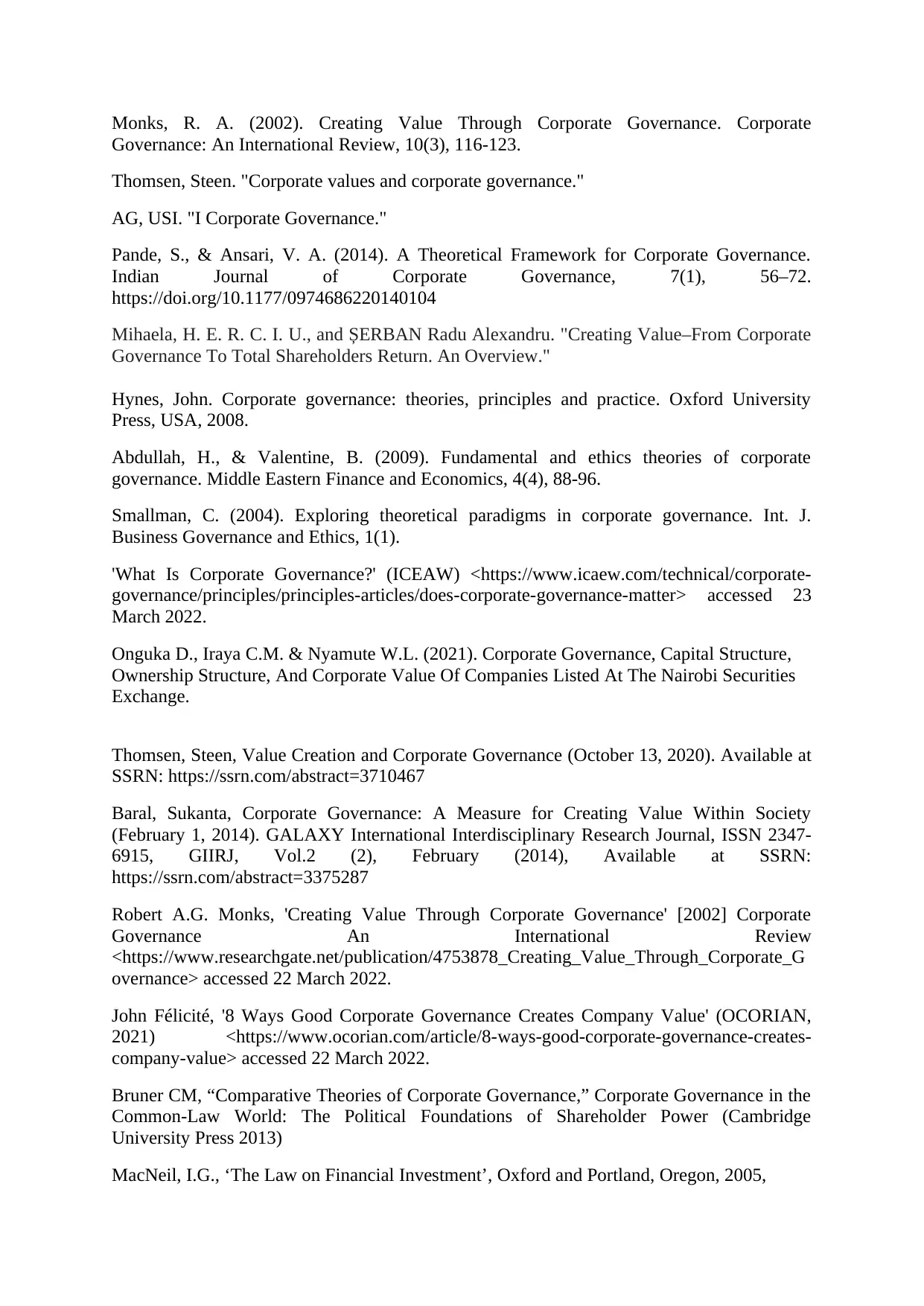
Monks, R. A. (2002). Creating Value Through Corporate Governance. Corporate
Governance: An International Review, 10(3), 116-123.
Thomsen, Steen. "Corporate values and corporate governance."
AG, USI. "I Corporate Governance."
Pande, S., & Ansari, V. A. (2014). A Theoretical Framework for Corporate Governance.
Indian Journal of Corporate Governance, 7(1), 56–72.
https://doi.org/10.1177/0974686220140104
Mihaela, H. E. R. C. I. U., and ȘERBAN Radu Alexandru. "Creating Value–From Corporate
Governance To Total Shareholders Return. An Overview."
Hynes, John. Corporate governance: theories, principles and practice. Oxford University
Press, USA, 2008.
Abdullah, H., & Valentine, B. (2009). Fundamental and ethics theories of corporate
governance. Middle Eastern Finance and Economics, 4(4), 88-96.
Smallman, C. (2004). Exploring theoretical paradigms in corporate governance. Int. J.
Business Governance and Ethics, 1(1).
'What Is Corporate Governance?' (ICEAW) <https://www.icaew.com/technical/corporate-
governance/principles/principles-articles/does-corporate-governance-matter> accessed 23
March 2022.
Onguka D., Iraya C.M. & Nyamute W.L. (2021). Corporate Governance, Capital Structure,
Ownership Structure, And Corporate Value Of Companies Listed At The Nairobi Securities
Exchange.
Thomsen, Steen, Value Creation and Corporate Governance (October 13, 2020). Available at
SSRN: https://ssrn.com/abstract=3710467
Baral, Sukanta, Corporate Governance: A Measure for Creating Value Within Society
(February 1, 2014). GALAXY International Interdisciplinary Research Journal, ISSN 2347-
6915, GIIRJ, Vol.2 (2), February (2014), Available at SSRN:
https://ssrn.com/abstract=3375287
Robert A.G. Monks, 'Creating Value Through Corporate Governance' [2002] Corporate
Governance An International Review
<https://www.researchgate.net/publication/4753878_Creating_Value_Through_Corporate_G
overnance> accessed 22 March 2022.
John Félicité, '8 Ways Good Corporate Governance Creates Company Value' (OCORIAN,
2021) <https://www.ocorian.com/article/8-ways-good-corporate-governance-creates-
company-value> accessed 22 March 2022.
Bruner CM, “Comparative Theories of Corporate Governance,” Corporate Governance in the
Common-Law World: The Political Foundations of Shareholder Power (Cambridge
University Press 2013)
MacNeil, I.G., ‘The Law on Financial Investment’, Oxford and Portland, Oregon, 2005,
Governance: An International Review, 10(3), 116-123.
Thomsen, Steen. "Corporate values and corporate governance."
AG, USI. "I Corporate Governance."
Pande, S., & Ansari, V. A. (2014). A Theoretical Framework for Corporate Governance.
Indian Journal of Corporate Governance, 7(1), 56–72.
https://doi.org/10.1177/0974686220140104
Mihaela, H. E. R. C. I. U., and ȘERBAN Radu Alexandru. "Creating Value–From Corporate
Governance To Total Shareholders Return. An Overview."
Hynes, John. Corporate governance: theories, principles and practice. Oxford University
Press, USA, 2008.
Abdullah, H., & Valentine, B. (2009). Fundamental and ethics theories of corporate
governance. Middle Eastern Finance and Economics, 4(4), 88-96.
Smallman, C. (2004). Exploring theoretical paradigms in corporate governance. Int. J.
Business Governance and Ethics, 1(1).
'What Is Corporate Governance?' (ICEAW) <https://www.icaew.com/technical/corporate-
governance/principles/principles-articles/does-corporate-governance-matter> accessed 23
March 2022.
Onguka D., Iraya C.M. & Nyamute W.L. (2021). Corporate Governance, Capital Structure,
Ownership Structure, And Corporate Value Of Companies Listed At The Nairobi Securities
Exchange.
Thomsen, Steen, Value Creation and Corporate Governance (October 13, 2020). Available at
SSRN: https://ssrn.com/abstract=3710467
Baral, Sukanta, Corporate Governance: A Measure for Creating Value Within Society
(February 1, 2014). GALAXY International Interdisciplinary Research Journal, ISSN 2347-
6915, GIIRJ, Vol.2 (2), February (2014), Available at SSRN:
https://ssrn.com/abstract=3375287
Robert A.G. Monks, 'Creating Value Through Corporate Governance' [2002] Corporate
Governance An International Review
<https://www.researchgate.net/publication/4753878_Creating_Value_Through_Corporate_G
overnance> accessed 22 March 2022.
John Félicité, '8 Ways Good Corporate Governance Creates Company Value' (OCORIAN,
2021) <https://www.ocorian.com/article/8-ways-good-corporate-governance-creates-
company-value> accessed 22 March 2022.
Bruner CM, “Comparative Theories of Corporate Governance,” Corporate Governance in the
Common-Law World: The Political Foundations of Shareholder Power (Cambridge
University Press 2013)
MacNeil, I.G., ‘The Law on Financial Investment’, Oxford and Portland, Oregon, 2005,
⊘ This is a preview!⊘
Do you want full access?
Subscribe today to unlock all pages.

Trusted by 1+ million students worldwide

Andrew Keay (2019) Having regard for stakeholders in practising enlightened shareholder
value, Oxford University Commonwealth Law Journal, 19:1, 118-138, DOI:
10.1080/14729342.2019.1619238
Reem Kabour, 'What Effect Does The Enlightened Shareholder Value Principle In The
Companies Act 2006 Have On The Corporate Objective Of UK Companies?' (2022) 8 IALS
Student Law Review <https://journals.sas.ac.uk/lawreview/article/view/5334> accessed 22
March 2022.
value, Oxford University Commonwealth Law Journal, 19:1, 118-138, DOI:
10.1080/14729342.2019.1619238
Reem Kabour, 'What Effect Does The Enlightened Shareholder Value Principle In The
Companies Act 2006 Have On The Corporate Objective Of UK Companies?' (2022) 8 IALS
Student Law Review <https://journals.sas.ac.uk/lawreview/article/view/5334> accessed 22
March 2022.
1 out of 10
Related Documents
Your All-in-One AI-Powered Toolkit for Academic Success.
+13062052269
info@desklib.com
Available 24*7 on WhatsApp / Email
![[object Object]](/_next/static/media/star-bottom.7253800d.svg)
Unlock your academic potential
Copyright © 2020–2026 A2Z Services. All Rights Reserved. Developed and managed by ZUCOL.





